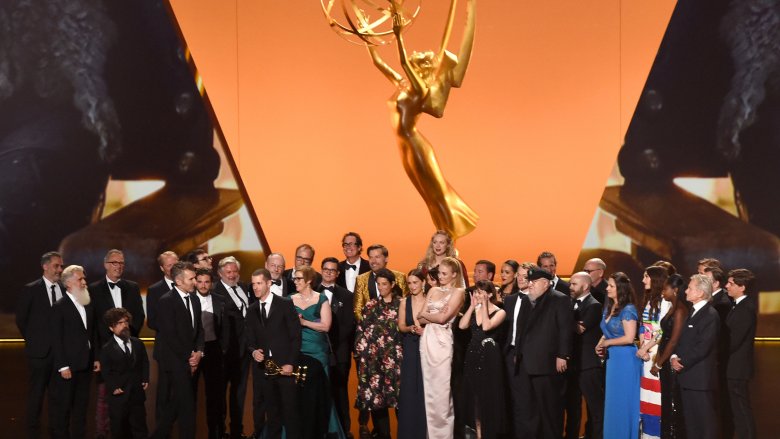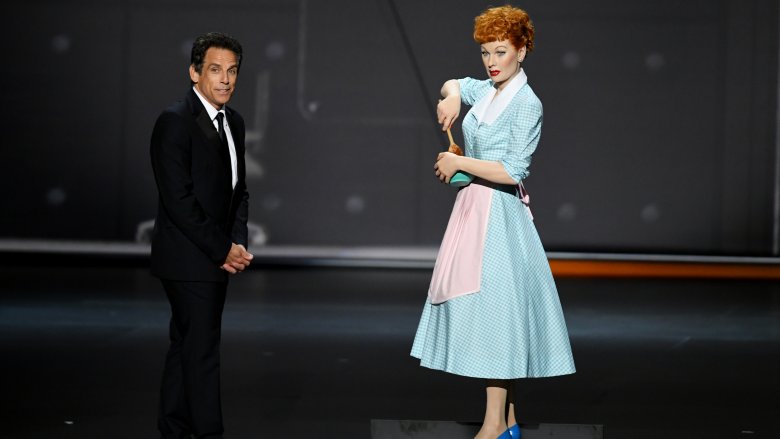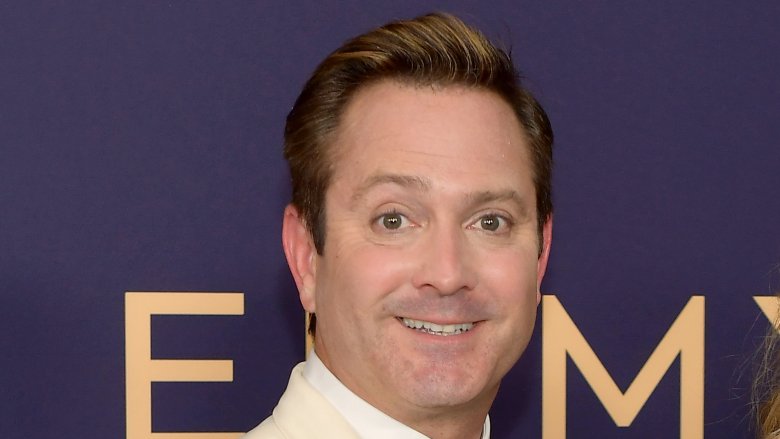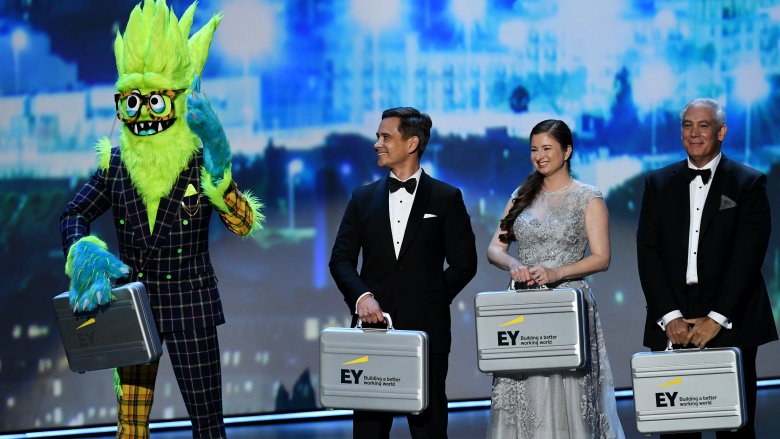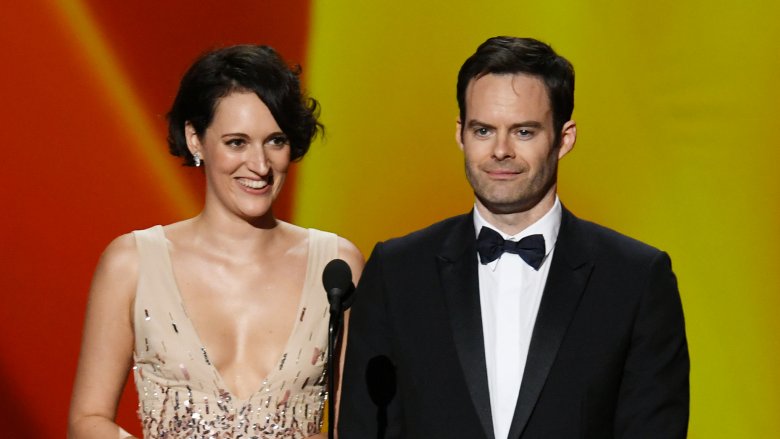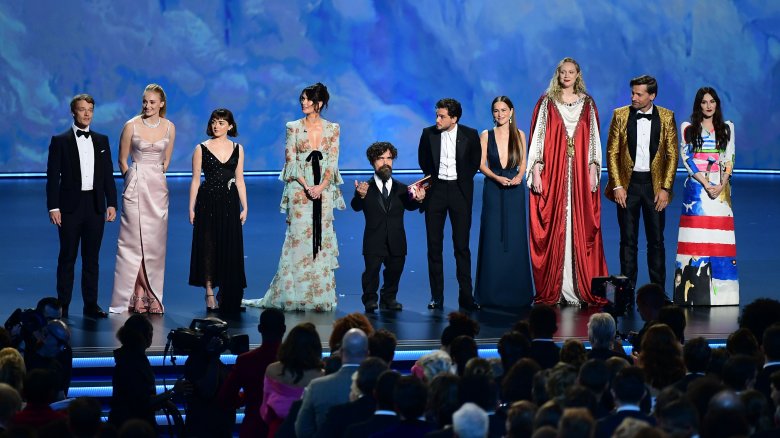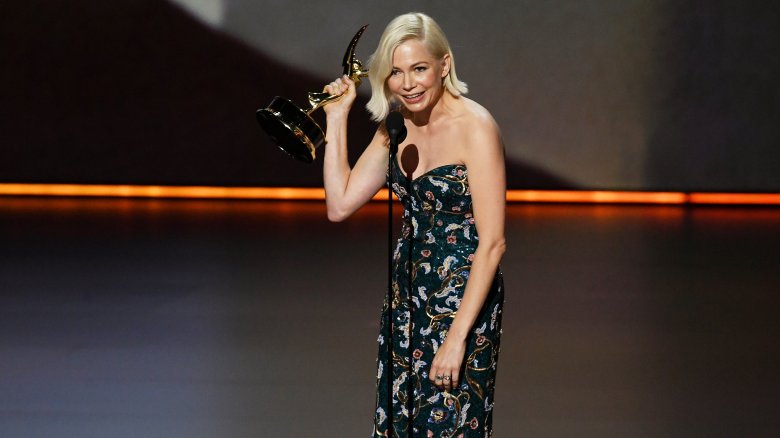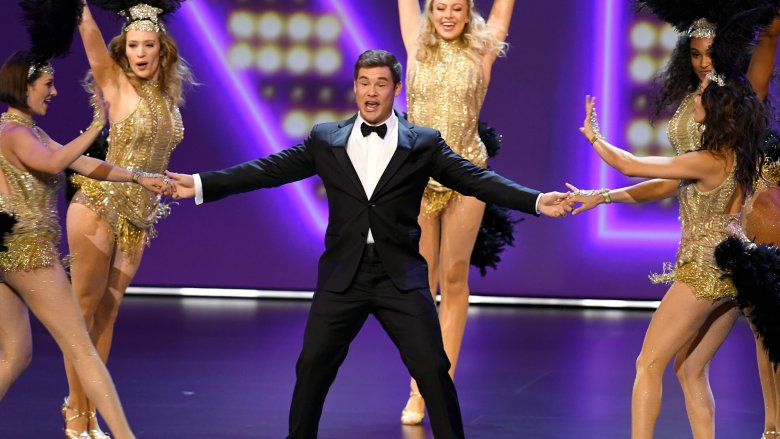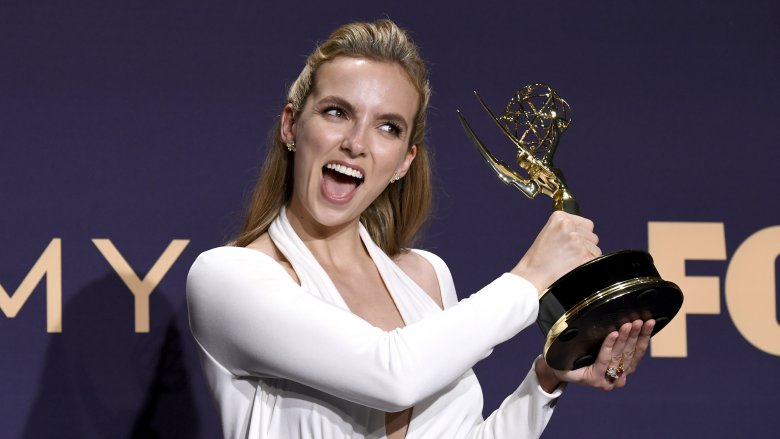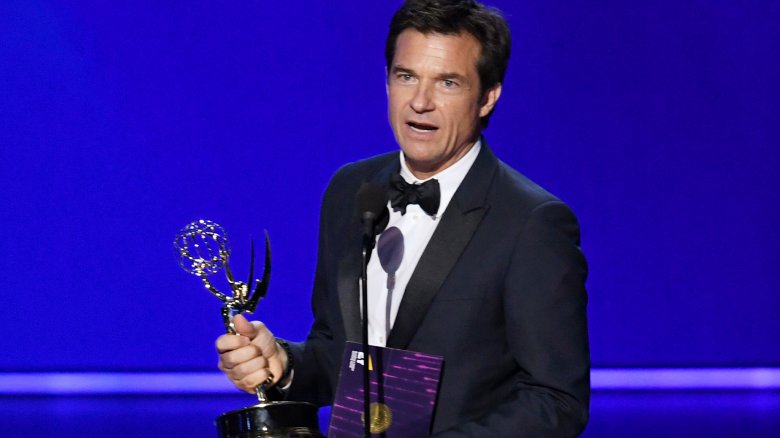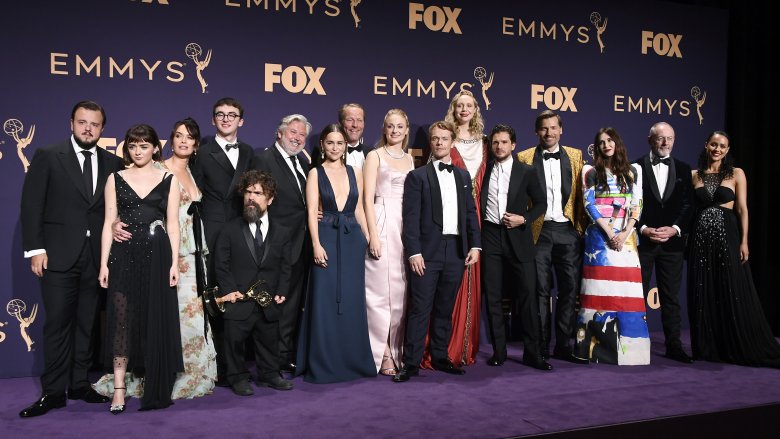5 Best And 5 Worst Things About The 2019 Emmys
The 2019 Emmy Awards aired at 8 PM EST on Sunday, September 22 on Fox, and, as expected, they provided plenty of unforgettable moments, thrilling upsets, emotional speeches, and even some closure for beloved series that ended this year. Working without a host for the first time since 2003, the Emmys had a lot to prove — especially since their 2018 telecast drew the lowest ratings in the history of the awards show — so for 2019, they came out swinging, doing their best to cement the event as a vital, relevant program that honors the very best work on the small screen.
As it turns out, the Emmys did make sure to reward the year's most relevant shows, which led to plenty of surprises, but beyond that, there were the requisite weird bits, awkward advertisements for Fox shows, heartfelt and shocked speeches, and welcome upsets — so all in all, this telecast was pretty Dickensian; it was either the best of times or the worst of times. Here are the five best and five worst things about the 2019 Emmys, from "masked singers" to newly crowned Emmy darlings.
Worst: A stilted opening followed by a bad bit
Going without a host was a bold move for this year's Emmys, but in the aftermath of last year's underwhelming ceremony (hosted by Saturday Night Live's Michael Che and Colin Jost), it probably seemed as good a time as any to take a huge risk. However, viewers may have wished the telecast hadn't spent its entire opening sequence lamenting the change, which made the situation kind of awkward; from Anthony Anderson's frantic, rushed gambit to find someone to kick things off to Bryan Cranston's ultimately eloquent but initially uncomfortable entrance onto the Emmys stage, it felt like the ceremony was basically apologizing for not having a host in the first place.
To follow that brief but botched opening, Ben Stiller started the evening's proceedings by introducing the comedy category, utilizing some truly terrifying robots that represented comedy icons like Lucille Ball and George Burns, only to stumble upon a very much alive Bob Newhart, with the joke being that Stiller thought he had died years ago. To conclude the bit by pretending that Newhart, one of the biggest names in television comedy, was presumed dead this whole time, was definitely pretty weird; all in all, it got the entire telecast off to an odd start.
Best: Thomas Lennon's live commentary
Usually, when a newly minted winner ascends to the stage during any awards ceremony, there's a voiceover that details how many awards they've previously won, but this year, the Emmys dispensed with the norm, hiring a much more unusual commentator. Enter Thomas Lennon, known for his comedic work on shows like Reno 911! and the CBS remake of The Odd Couple, acting as a sort of sports announcer on and off camera during the show. Lennon added some much-needed whimsy to the proceedings by providing facts that viewers didn't even know they needed, and though he seemed less than pleased with his role, it was definitely a welcome addition for viewers craving something different.
Rather than providing the usual dry, boring facts about the winners, Lennon got weird with his commentary, adding some much-needed whimsy, including jokes like about "a little studio like Amazon" somehow making hits like Fleabag, giving a quick shoutout to "former nominees" who may or may not currently be serving time in prison (read: Felicity Huffman), saying that Ben Whishaw's last name is the sound that occurs when a "handsome British man passes you on a bicycle," or noting that Patricia Arquette goes to the Emmy stage "more than she goes to Trader Joe's."
Worst: Stop trying to make The Masked Singer happen
Every year, awards shows air on different networks, and naturally, those networks have an agenda of their own, trying to integrate their own promotions into a ceremony that probably has nothing to do with those totally independent projects. This rarely feels like a good idea, and this year, Fox was pretty transparent about promoting one of their latest reality shows.
Even during the red carpet proceedings leading up to the actual telecast, one thing was clear: Fox really, really wanted Emmy viewers to tune into The Masked Singer, a game show in which moderately famous singers don full-body costumes and try to trick celebrity judges like Ken Jeong, Robin Thicke, Nicole Scherzinger, and Jenny McCarthy regarding their true identities. Based on a South Korean game show, the American remake, in advance of its second season, took advantage of the Emmys by letting masked animals take over the red carpet, subjecting viewers to a painful presenting gig by Jeong and Masked Singer emcee Nick Cannon, a bit during the requisite presentation of the Emmy accountants that featured a masked voter, and even another giant animal shoehorned in during an elaborate musical sequence. Fox might be all in on The Masked Singer, but they should let audiences decide for themselves.
Best: A particularly victorious pair of presenters
The 2019 Emmys telecast showcased plenty of great presenters, including comedians like Amy Poehler and Catherine O'Hara (who tried to outdo each other with superlatives to describe the nominees) to Maya Rudolph and Ike Barinholtz (who did a bit about recently getting LASIK surgery that achieved diminishing returns as it went on), but one of the best pairings of the night ended up happening at exactly the right moment.
Shortly after the comedy categories wrapped up, two actors took their place to present the award for Best Supporting Actor in a Limited Series — and as it turns out, the two had already won statues for themselves. By the time Phoebe Waller-Bridge and Bill Hader arrived on stage, they'd taken home top prizes for Outstanding Actress and Actor in a Comedy Series, respectively, and they both looked even more thrilled to return to present, leading to a delightful bit where they took on the very concept of a "limited series" (when Waller-Bridge asked Hader exactly what a limited series was, he told her it was essentially a show that had been canceled), leading to a finish where Hader announced the nominees for "limited actor in a canceled series." After that showing, the internet at large has been clamoring for the two to star in a romantic comedy together, and it's easy to see why.
Worst: The weird Game of Thrones presentation
Some major hit series wrapped up their runs in 2019, and the Emmys saw fit to honor their achievements beyond the awards, singling out two HBO series and relegating several other shows (like Broad City and Jane the Virgin, neither of which were ever nominated for Emmy awards) to a montage of other recently concluded series.
Both Veep and Game of Thrones got their own presentations in which the majority of each show's cast came out to present a different award, but there were some seriously varying levels of success between the two. Veep struck a perfect chord, letting star Julia Louis-Dreyfus (on the heels of her loss to Phoebe Waller-Bridge) pull a full Selina Meyer and express her immediate frustration that her cast members were overshadowing her — after all, she was the Veep on, well, Veep — only allowing Tony Hale to remain by her side.
However, the Thrones presentation was decidedly more awkward; though it soon became clear that the only actors onstage were the ones nominated for awards during the ceremony, the announcement that the "cast of Game of Thrones" would take the stage became a little more awkward when the camera panned to Thrones stars like John Bradley and Isaac Hempstead-Wright still in the audience. Though it was heartwarming to see star Gwendoline Christie tear up when she received a huge swell of applause, the entire thing also felt incredibly awkward.
Best: Speeches that called the audience to action
Winning an Emmy or any other major award isn't really about the golden statue (though it's certainly a nice gift to take home), but about the recognition and exposure a performer can gain by winning the accolade in the first place. With that it mind, it makes sense that plenty of actors use their victory speeches to speak to issues that are of the utmost importance to them.
Patricia Arquette, who won for Outstanding Supporting Actress in a Limited Series for The Act and whose sister Alexis Arquette, a transgender performer and activist, passed away from complications related to HIV in 2016, spoke out about transgender rights, imploring both Hollywood and the world at large to remember that transgender people are equal to anyone else. Alex Borstein, who took home her second consecutive award for The Marvelous Mrs. Maisel, mentioned her grandmother, a Holocaust survivor who overcame insurmountable odds. Michelle Williams, who has long been a crusader for equal pay, told audiences how she was listened to and paid equally on the set of Fosse/Verdon (she won for playing the leading role of Gwen Verdon in the limited series) and brought pay inequality back to the forefront of the conversation. Finally, Billy Porter, who made history with his win for Outstanding Lead Actor in a Drama for Pose, reminded anyone watching that they, like him, have a place at the table, no matter how different they might feel.
Worst: That musical number to introduce the Variety categories
The middle of the show tends to flag, and the Emmys went to great lengths to try and make sure that the momentum remained strong between presentations of the big categories like Comedy and Drama. After the limited series categories wrapped up, viewers waited for the variety show categories, unaware that there was a huge, ultimately unsuccessful spectacle on the way to welcome the next phase of the show.
Suddenly, Adam DeVine, known for films like Pitch Perfect and shows like Workaholics and The Righteous Gemstones (the latter of which recently started its run on HBO), burst onto the stage, singing a large, elaborate number which even included a cameo from Full Frontal's Samantha Bee. However, the number really didn't work; between yet another Masked Singer reference, poor microphone quality (it was nearly impossible to discern what DeVine was even singing), and the weird tone of the entire thing, it just felt extraordinarily out of place, with some outlets even calling it "bizarre" — an unsurprising adjective, considering that the hostless show largely did away with this kind of pomp and circumstance during the rest of the telecast.
Best: Upsets and newcomers took home the gold
During every awards ceremony, there are assumed frontrunners for every award, but it's always a delight to see those expectations completely subverted when new names take center stage and start building their careers.
This year's Emmys ceremony saw several first-time nominees take home the gold, and judging by their reactions, they definitely didn't expect to triumph over more established performers. Perhaps the biggest and most welcome upset of the night was that of Phoebe Waller-Bridge and her magnificent, groundbreaking show Fleabag; throughout the night, Waller-Bridge took home an acting and writing award for herself, and the show even beat out Emmys stalwart Veep for Best Comedy (and Waller-Bridge defeated Emmys record-breaker Julia Louis Dreyfus, nominated for her final, formidable turn in Veep). Game of Thrones, which was expected to scoop up statues for writing and directing, lost the writing accolade to Succession (another HBO show), which won for its stunning first season finale. Beyond that, first-time nominees like Billy Porter (Pose), Julia Garner (Ozark), Jharrel Jerome (the youngest-ever Limited Series acting winner for When They See Us), and Jodie Comer (Killing Eve) took home the acting awards in the Drama category, cementing themselves as bona fide stars and proving that you don't need to be extraordinarily famous to score television's greatest honor.
Worst: All the Ozark wins
Going into the ceremony, several eventualities felt like a sure thing: Game of Thrones would reign supreme, Fleabag and Veep would go toe-to-toe for best comedy, and the show would be fairly predictable, despite a few potential upsets. Though some of the upsets were welcome shifts to the narrative, some of them were downright weird, many of which had to do with the Netflix series Ozark.
To be fair, there's nothing directly wrong with Ozark as a series; it's received solid reviews from critics since 2017, but the show, led by Jason Bateman and Laura Linney, has barely made any sort of cultural impact despite its star power. The first Ozark-related surprise came during the Outstanding Supporting Actress in a Drama category, when one of its stars, Julia Garner, shockingly triumphed over four different Game of Thrones actresses, including Maisie Williams, Lena Headey, Sophie Turner, and Gwendoline Christie. (Ultimately, this means that not a single female cast member from Thrones will ever win an acting award for their work on the show, which is disappointing to say the least.) Shortly after that, Bateman pulled off a huge upset to defeat Thrones showrunners David Benioff & D.B. Weiss for Outstanding Directing for a Drama Series (he pulls double duty on the show regularly). During Thrones' final year of nominations, Ozark seems like a really odd choice to take home the top prizes.
Best: Game of Thrones takes its last crown
The fact that Game of Thrones took home the Emmy for Outstanding Drama Series might make some viewers angry, but in this case, it's better to look at the legacy of the entire show. Sure, the final season divided the audience thanks to its rushed pace, questionable character development, and controversial choices across the board, but it may be a long time before we see another television series like Game of Thrones; odds are it won't be matched in scope, ambition, or scale for years to come.
Even if you're disappointed that Thrones won anything at all, you can take solace in the fact that it certainly didn't sweep the awards for which it was nominated. Fittingly, Peter Dinklage took home his fourth statue for his career-defining portrayal of Tyrion Lannister (one of the anchoring performances of the final season), and though the series lost all of the other acting awards for which it was nominated as well as awards for writing and directing, it does feel right to award Game of Thrones with a sort of "series achievement" Emmy after it closed out a momentous run.
